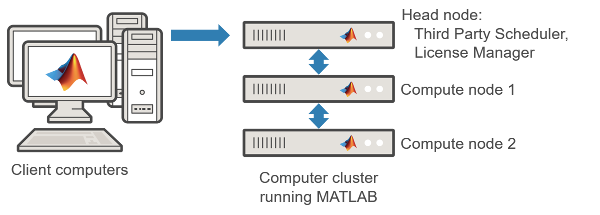Install MATLAB Parallel Server for Other Third-Party Schedulers
If you already have a cluster with a scheduler, follow these instructions to integrate MATLAB® with your scheduler using MATLAB Parallel Server™. If you do not have an existing scheduler in your cluster, see: Install for MATLAB Job Scheduler with Network License Manager.
These instructions guide you through the following tasks:
After you integrate MATLAB with a scheduler, you can access workers in your cluster from a desktop MATLAB client session with Parallel Computing Toolbox™. Workers are MATLAB computational engines that typically correspond to a core.
The setup in these steps uses the network license manager.
Activate Your MATLAB Parallel Server License
To install MATLAB Parallel Server, you must activate your license. To activate your MATLAB Parallel Server license:
Navigate to https://www.mathworks.com/licensecenter.
Log into the Administrator’s MathWorks Account.
Select your MATLAB Parallel Server license, and click the Install and Activate tab.
At the rightmost side, under RELATED TASKS, select Activate to Retrieve License File.
Fill in the requested information. This information must refer to the machine that hosts the license manager. In these instructions, it is the head node. For more information, see Install License Manager.
After filling in the information, download or email the License File and copy the File Installation Key. These are used later in the process.
Note
Activation is not necessary for trials. Contact your sales representative to obtain the License File and the File Installation Key.
Get the Installation Files
To save time and eliminate the need for the installer-based download process for each computer in your cluster, download the installation files prior to installation. Doing so facilitates installation in a large number of machines. If you have access to an Administrator’s account for your license, you can use the installer to download files without installing them. If not, contact the administrator of your license to obtain a copy of the installation files. For more information, see Download Products Without Installing. When using the installer to download the files, choose the following options:
Select the appropriate operating system for the cluster nodes.
Select all products for download. MATLAB Parallel Server cannot run jobs requiring products that are not installed.
There are three server-side components of MATLAB Parallel Server:
The license manager, which hosts the MATLAB Parallel Server license used by each worker. For more information, see Install License Manager.
Your third-party job scheduler, which runs on the head node and manages jobs on your cluster. You integrate this scheduler with MATLAB Parallel Server. For more information, see Install License Manager and Configure Your Cluster.
MATLAB Parallel Server, which runs on the compute nodes. For more information, see Install Software on Compute Nodes.

Install License Manager
Choose a computer node to host the license manager. For the installation, use the offline installer from the previous step. For more information on the offline installation procedure, see Install Products on Offline Computer.
Start the MATLAB installer from the installation files acquired in Get the Installation Files.
Select Advanced Options > I want to install network license manager.
In the License File step, browse to your
license.licfile (obtained from Activate Your MATLAB Parallel Server License).Continue through the prompts to complete the network manager installation. For more information about the procedure, see Install License Manager on License Server
Start the license manager.
Install Software on Compute Nodes
This procedure is similar to Install License Manager. For more information on the offline installation procedure, see Install Products on Offline Computer.
Start the MATLAB installer from the installation files acquired in Get the Installation Files.
Select Advanced Options > I have a File Installation Key and continue through the prompts.
Select all products. Alternatively, to save space, install only the products that the users of the cluster are licensed for.
Use the
license.datfile from the head node. You can obtain this file from thematlabroot/etcfolder, wherematlabrootis the MATLAB installation folder.
For best performance, install locally on each node. However, you can also install in a network share location.
Note
Install noninteractively (silently) instead if you want to
Install the software on a machine without graphical user interface (GUI).
Save the time that it takes to configure the installer for each compute node.
For more information, see Install Products Programmatically.
You can test the installation and licensing by running the following command in a
command-line interface. matlabroot is the MATLAB installation folder. filename is the
location to write the log file to, for example, a temporary location. You must have
write permissions in this
location.
matlabroot/toolbox/parallel/bin/checkLicensing -logfile filename
Note
You do not need to start the mjs service when you want to configure MATLAB Parallel Server for a third-party scheduler.
Install Software on Local Desktop
To use MATLAB Parallel Server, you must use a local desktop running MATLAB and Parallel Computing Toolbox. Install the MathWorks® products for which you are licensed, including Parallel Computing Toolbox, on the local desktops from which you want to submit jobs to the cluster. For help with this step, see Installation and Licensing.
Any MATLAB cluster workers that you start use dynamic licensing: they can use all the functionality you are licensed for in the MATLAB client, while checking out only MATLAB Parallel Server licenses in the cluster.
Configure Your Cluster
When the cluster and client installations are complete, you can proceed to configure the products for the job scheduler of your choice. Use this table to choose a suitable guide to complete your configuration.
| Next step | More information |
|---|---|
Use out-of-the-box support if the scheduler has out-of-the-box support in MATLAB. Schedulers with out-of-the-box support are:
| |
| Use out-of-the-box support if you have a Hadoop® cluster. | |
| Use out-of-the-box support if you have a Spark™ cluster. | |
Use the generic scheduler interface if your scheduler does not have out-of-the-box support. |